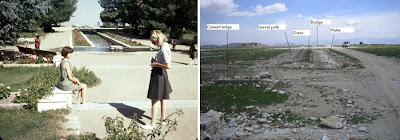
"The public expresses a range of feelings about the news concerning the war in Afghanistan: a majority (56%) often feels that "it seems like the same news about the war in Afghanistan all the time, nothing ever really changes"; 42% say they do not often feel this way. Nearly as many (53%) say they do not always have enough background information to follow the news about Afghanistan. By contrast, far fewer Americans (26%) say the news about the war is so depressing they would prefer not to follow it. Only 20% say they feel guilty about not following news from the war in Afghanistan more closely."Additional data crunching at the Pew Research Center, via Talking Points Memo.
For another viewpoint on the situation in Afghanistan, see the video at The Guardian, which I can't embed here. The 7-minute report comes from a British reported embedded with troops there. The report - "These People Just Want to be Left Alone" - has some notable comments starting at about the 4:30 mark from an American who can't figure out why the Afghan people can't be more like Clint Eastwood in a Sergio Leone spaghetti Western:
"These people are so fickle, man, and full of s***. They say, like, Taliban comes down and, like, f****** aggravates their towns and, like, harasses them and s***. It's like three dudes, two dudes, at a time. How many people are there in their village. Couple hundred, whatever. O.K., why don't you f****** kill those motherf******? All of you have AKs, or some type of weapon. "But, but, they come down and they kill us." Well, kill them! I mean, if someone's going into MY home town, I know my f****** town wouldn't stand for that s*** - they'd be like "F*** you, you're dead.""The video goes on to demonstrate the frustrations of the soldiers with inadequate vehicles designed for the roads of Iraq and unsuitable for the wilds of Afghanistan.
The War in Afghanistan has now gone on longer than the Civil War, World War I, World War II, and the Iraq War. It's been over 8 years since October 7, 2001. Next milestones to surpass - American Revolution (8 years 4 months, 16 days) and the Vietnam War (8 years, 5 months, 21 days).












